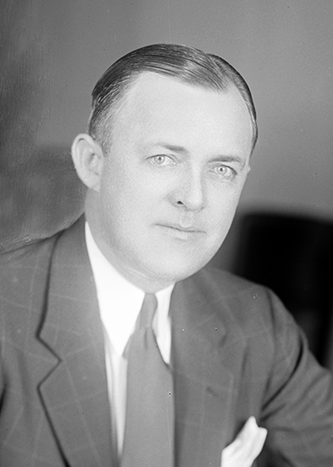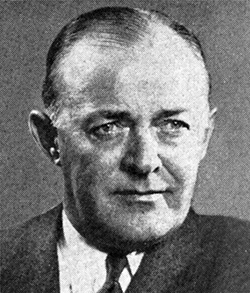26 July 1897–15 Jan. 1974

Harold Dunbar Cooley, lawyer, farmer, and congressman, was born in Nashville, Nash County, one of five children of Roger A. Pryor and Hattie Davis Cooley. He was educated in the public schools of Nash County. Cooley's father died when he was nine years old and his mother when he was sixteen; the five orphaned Cooley children decided to maintain their family home and "bring each other up," a decision that resulted in the formation of strong family ties among the four children surviving after one of them, Hubert, was killed in an automobile accident.
As a youth, Cooley showed little inclination to follow his father in the path of the law. When he was eighteen, however, he made the first of two decisions that were to have basic effects upon shaping his future, and decided to enter the legal profession. He attended the Law School of The University of North Carolina for two years and then, in the spring of 1918, applied to take the North Carolina Supreme Court's examination for admission to the bar, prior to graduating from law school and prior to attaining the minimum licensing age of twenty-one. He received his license to practice law on his twenty-first birthday.
After passing the bar examination, Cooley enlisted in the U.S. Navy. He was engaged in ground training with the Naval Aviation Flying Corps in Massachusetts at the conclusion of World War I. Before returning to North Carolina, he was accepted as a special student at the Yale University Law School, where he studied constitutional law under William Howard Taft. He returned to Nashville in 1919 and opened a law office. He soon developed a successful practice, being particularly adept at courtroom work; later he formed a partnership with Walter Bone.
Cooley first became active politically as an advocate for other candidates of the Democratic party; in the process, he became known for his oratorical ability. He was one of the chief advocates for the Democratic presidential and gubernatorial nominees in the election of 1928, and in 1932 he was one of the Democratic presidential electors in North Carolina. Two years later, following the death in April 1934 of Edward W. Pou, who had represented the Fourth Congressional District uninterruptedly for thirty-three years, Cooley decided to become a candidate. Although there were five candidates for the Democratic nomination, Cooley received a majority vote and was nominated in the first primary. In the general election he was elected for the first of seventeen successive terms in the U.S. House of Representatives.
Cooley's service in Congress was associated primarily with agricultural affairs and agricultural policy. His interest in agricultural matters stemmed from his early and close personal association with farming, in connection first with his father's farming activities and then with his own. Even while practicing law and serving in Congress, he continued to operate his farms, and visits to them were a regular part of his schedule when he returned home. During his first campaign for election he announced that he would seek membership on the House Committee on Agriculture if he were elected; and, in spite of the difficulty of securing membership on such an important committee as a first-year congressman, he succeeded. He joined the committee during the early stages of the development of the New Deal agricultural program, took an active part in the formulation of the program, and thereafter remained a lifelong advocate of its many features: production controls through acreage and marketing allotments, parity price supports for agricultural products, aids to farm credit, rural electrification, and soil conservation. Twice during his congressional career he opposed administration proposals for modifications of agricultural policy that he thought threatened the New Deal price support program. This opposition brought him into conflict with both a Democratic and Republican secretary of agriculture, each of whom had the support of the president. Cooley opposed the so-called Brannan Plan, proposed by Secretary of Agriculture Charles Brannan with the support of President Truman, to pay a direct government subsidy to producers of perishable farm products, the subsidy to equal the difference between parity price and the lower price on the open market when the goods were sold. This principle of maintenance of farm income by subsidy was to replace the program of government loans to maintain parity prices on the market, a program that produced large government-owned surpluses. The same policy was advocated by Ezra Benson, President Eisenhower's secretary of agriculture, for butter producers.
In 1949, in the Eighty-first Congress, Cooley's seniority on the House Agriculture Committee secured for him its chairmanship; the first North Carolina representative to hold this position in 104 years, he continued in it for the remainder of his congressional tenure, except during the Eighty-third Congress, when a Republican majority controlled the House. This important chairmanship consumed a large part of his time and energy, but it enabled him to wield a large influence in the House, particularly on matters dealing with agriculture. He utilized this influence in the early 1960s to secure approval of the Food for Freedom Program, which provided for the government's sale of surplus farm commodities in foreign nations. Cooley considered that this program would not only aid people in needy nations but would also help to solve a major problem of American agriculture, underconsumption of farm products, by helping to create a foreign market. His long tenure as committee chairman and his constant advocacy of agricultural welfare led him to be recognized as the outstanding representative of farm interests in the House.
Cooley's success in securing support in Congress for agricultural legislation was based partly on his skill in maintaining good working relationships with representatives of other interests; he exchanged support, for example, with proponents of urban programs. When opponents criticized him as too liberal for his constituency, he defended himself by maintaining that support of these so-called liberal measures enabled him to secure sufficient votes for his agricultural programs. As he told reporters after his defeat for reelection in 1966, "I voted for a lot of things I caught hell for, but I couldn't just vote for peanuts, popcorn, cotton, and tobacco and nothing else. I never betrayed my conscience, though."
Cooley's voting record and his clashes with Secretaries Brannan and Benson and Presidents Truman and Eisenhower were not the only controversial issues in which he became involved as chairman of the House Agricultural Committee. Because of the program of maintaining parity prices through loans to farm producers, the government held large stocks of surplus goods. This phenomenon and the charge that the program contributed to higher consumer prices made price supports increasingly controversial and especially unpopular in urban centers during the 1950s and 1960s. Another controversy in which Cooley became involved occurred during the Johnson administration. Liberal elements attacked Cooley, claiming that he used the influence of his chairmanship to put pressure on House Democratic leaders to prevent Adam Yarmolinsky's appointment as an important assistant to Sargent Shriver, head of President Johnson's antipoverty program. Cooley insisted he had no personal opposition to Yarmolinsky's appointment but that, in acting to block it, he was merely representing the wishes of the North Carolina House delegation. Another subject on which he became the target of criticism was his sponsorship of legislation establishing import quotas for foreign sugar producers. He was charged with being the tool of lobbyists for sugar interests and with accepting favors, particularly from the Dominican Republic, in return for favorable decisions concerning sugar quotas. His reply to these charges was that the sugar quota policy was in the nation's interest and that the whole question of sugar quotas was too complicated to explain to the layman. He acquired from his critics the nickname "sugar daddy."
Along with his interest in domestic agriculture, Cooley also developed strong interest in world agricultural affairs. In the post-World War II days he represented Congress on a number of committees that studied agricultural problems abroad, and in this connection he traveled in both Europe and in the Pacific area. He also attended meetings of the Inter-Parliamentary Union as an American delegate in Cairo in 1947, Rome in 1948, Stockholm in 1949, and Dublin in 1950, serving as president of the American delegation at some of the conferences. He was consultant and congressional adviser to the United Nations Educational, Scientific, and Cultural Organization.

After his success in the 1934 election, Cooley remained the representative of the Fourth North Carolina District until December 1966, with little opposition until 1964. His long record of political success was to a large degree based on his active advocacy of agricultural interests, particularly tobacco farming, in a district that until his later years was heavily rural, with a predominant interest in farming. His success was also, no doubt, facilitated by his personal characteristics: a rather large and somewhat debonair man, he was personally attractive; and to his appearance he added a basically sincere friendliness in his dealings with people. In 1956 a Raleigh radio commentator, W. E. Debnam, opposed Cooley for the Democratic nomination, but Cooley easily turned back the challenge. In 1964 and 1966, however, both in the Democratic primaries and in the general elections, he faced formidable opposition. In 1964 a Raleigh attorney, Mayne Albright, who had unsuccessfully attempted to secure the Democratic gubernatorial nomination in 1948, contested his nomination; in 1966, Cooley faced primary opposition from William Creech, an attorney from Smithfield in Johnston County, who had moved to Raleigh in order to run for the office when Johnston County was separated from the Fourth District. Cooley succeeded in beating back both challenges, but only after strenuous campaigns and by rather narrow vote margins in each case.
In both 1964 and 1966, Cooley was offered strong opposition in the general election by his Republican challenger, James W. Gardner, a young Rocky Mount businessman. In 1964, Cooley defeated Gardner by about 5000 votes of some 140,000 cast. Immediately upon his defeat, Gardner announced that he would try again two years later and embarked upon a vigorous campaign of public appearances and work within the Republican party organization in the state. In his second effort, Gardner was successful, defeating Cooley after a bitter campaign, by approximately 12,000 votes of about 96,000 cast.
In 1923, Cooley married Madeline Matilda Strickland, whom he had known since boyhood; a graduate of the New England Conservatory, she was an accomplished pianist. They had two children, Roger A. Pryor II and Hattie Davis. Shortly after their marriage, the Cooleys purchased the Gassaway house on Nashville's Main Street, gratifying Cooley's desire to have the largest, whitest house in town. This remained their home, and they returned to it when he left his congressional seat in December 1966 and resumed his Nashville law practice.
Cooley died at Wilson Memorial Hospital, where he had been hospitalized for several months for treatment of emphysema. He was buried in Forest Hill Cemetery in Nashville.